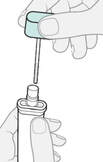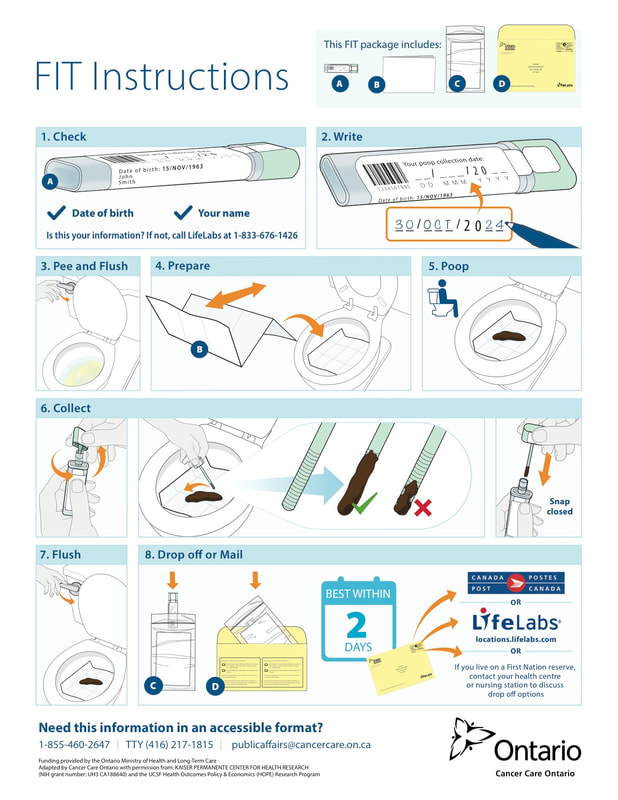ColonCancerCheck -
Learn about Colorectal Cancer

What is Colorectal Cancer? Colorectal cancer refers to cancer of the colon or rectum. The colon, which is also called the large intestine or large bowel, is a hollow tube five to six feet long and is coiled within the abdomen. The rectum is the last six inches of the colon. This is not a part of our bodies we spend a lot of time thinking about and certainly not talking about, but the colon is a hardworking organ that helps our bodies absorb water and to excrete waste.
Cancer in the colon or rectum can take up to 10 years or more to develop to an advanced stage. That’s why it’s very important to make regular screening for colorectal cancer a part of your routine health checks.
What are the causes of colorectal cancer?
When normal cells that form the lining of the colon begin to grow abnormally a small precancerous growth can form. The trouble often begins with a 'polyp', which is a non-cancerous growth projecting from the inner lining of the colon or rectum. Polyps are not cancerous at the beginning, but some polyps do turn into cancers. If polyps are removed in their early stages colorectal cancer can be prevented. But if left unchecked, some polyps can slowly become cancers.
Read more about prevention and screening for colorectal cancer.
What are the symptoms of colorectal cancer?
During the early stages polyps may grow to a large size without causing any symptoms. As colorectal cancer progresses, the following symptoms may occur:
• A change in your bowel movements
• Unexplained weight loss
• Fatigue
• Vomiting
It’s important to note that these symptoms can also be caused by other health problems. For instance, blood in the stool can be caused by inflammation of the bowels or hemorrhoids. But it’s better to be safe than sorry. Don’t hesitate to talk to your health care provider during your next health visit about these symptoms.
For more information click here
Cancer in the colon or rectum can take up to 10 years or more to develop to an advanced stage. That’s why it’s very important to make regular screening for colorectal cancer a part of your routine health checks.
What are the causes of colorectal cancer?
When normal cells that form the lining of the colon begin to grow abnormally a small precancerous growth can form. The trouble often begins with a 'polyp', which is a non-cancerous growth projecting from the inner lining of the colon or rectum. Polyps are not cancerous at the beginning, but some polyps do turn into cancers. If polyps are removed in their early stages colorectal cancer can be prevented. But if left unchecked, some polyps can slowly become cancers.
Read more about prevention and screening for colorectal cancer.
What are the symptoms of colorectal cancer?
During the early stages polyps may grow to a large size without causing any symptoms. As colorectal cancer progresses, the following symptoms may occur:
• A change in your bowel movements
- • Blood (either bright red or very dark) in your stool (feces)
- • Diarrhea, constipation or feeling that your bowel does not empty completely
- • Stools that are narrower than usual
• Unexplained weight loss
• Fatigue
• Vomiting
It’s important to note that these symptoms can also be caused by other health problems. For instance, blood in the stool can be caused by inflammation of the bowels or hemorrhoids. But it’s better to be safe than sorry. Don’t hesitate to talk to your health care provider during your next health visit about these symptoms.
For more information click here
Testing Options

1. Your Home Test Kit (FIT)
As of June 24, 2019, FIT will be the recommended screening test for people at average risk of getting colorectal cancer*. FIT will be available across the province through Cancer Care Ontario’s organized colorectal cancer screening program, ColonCancerCheck.
FIT is a safe and painless stool-based test used for screening people at average risk of developing colorectal cancer. Specifically, FIT checks for the presence of occult blood in the stool, which can be an early sign of colorectal cancer and/or pre-cancerous polyps. This test is requested by your health care provider and the kit will be mailed to your home.
*Average risk is defined as people ages 50 to 74 with no first-degree relative who has been diagnosed with colorectal cancer
As of June 24, 2019, FIT will be the recommended screening test for people at average risk of getting colorectal cancer*. FIT will be available across the province through Cancer Care Ontario’s organized colorectal cancer screening program, ColonCancerCheck.
FIT is a safe and painless stool-based test used for screening people at average risk of developing colorectal cancer. Specifically, FIT checks for the presence of occult blood in the stool, which can be an early sign of colorectal cancer and/or pre-cancerous polyps. This test is requested by your health care provider and the kit will be mailed to your home.
*Average risk is defined as people ages 50 to 74 with no first-degree relative who has been diagnosed with colorectal cancer
Get your FIT test results
ColonCancerCheck will send a letter with your results to you and your health care provider. What happens next depends on your results:
If your result is negative (-)ColonCancerCheck will send you a reminder letter in 2 years, when it’s time for another test.
If your result is positive (+)It means there’s blood in your stool. This doesn’t always mean you have cancer. You’ll need to follow up with a colonoscopy to find out.
If you have a health care provider, he or she should contact you to arrange the next steps.
If you don’t have a health care provide, ColonCancerCheck will arrange for your follow-up care.
If you don’t get your results within a month, contact your health care provider. If you don’t have a health care provider, call ColonCancerCheck directly at 1-866-410-5853.
ColonCancerCheck will send a letter with your results to you and your health care provider. What happens next depends on your results:
If your result is negative (-)ColonCancerCheck will send you a reminder letter in 2 years, when it’s time for another test.
If your result is positive (+)It means there’s blood in your stool. This doesn’t always mean you have cancer. You’ll need to follow up with a colonoscopy to find out.
If you have a health care provider, he or she should contact you to arrange the next steps.
If you don’t have a health care provide, ColonCancerCheck will arrange for your follow-up care.
If you don’t get your results within a month, contact your health care provider. If you don’t have a health care provider, call ColonCancerCheck directly at 1-866-410-5853.
2. Get a colonoscopy
A colonoscopy is an examination of the lining of your rectum and colon using a long flexible tube with a camera on the end. This test is for people with a higher risk of cancer. Your doctor may recommend and arrange this test if:
A colonoscopy is an examination of the lining of your rectum and colon using a long flexible tube with a camera on the end. This test is for people with a higher risk of cancer. Your doctor may recommend and arrange this test if:
- you have a positive FIT result
- a sibling, child or parent had colorectal cancer


